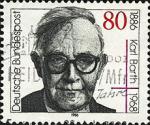Disable ads!
Karl Barth
Karl Barth (/bɑrt/; German: [baʀt]; (1886-05-10)May 10, 1886 – December 10, 1968(1968-12-10)) was a Swiss Reformed theologian who is often regarded as the greatest Protestant theologian of the twentieth century. His influence expanded well beyond the academic realm to mainstream culture, leading him to be featured on the cover of Time on April 20, 1962. Beginning with his experience as a pastor, Barth rejected his training in the predominant liberal theology typical of 19th-century European Protestantism. He also rejected more conservative forms of Christianity. Instead he embarked on a new theological path initially called dialectical theology due to its stress on the paradoxical nature of divine truth (e.g., God's relationship to humanity embodies both grace and judgment). Many critics have referred to Barth as the father of neo-orthodoxy — a term that Barth emphatically rejected. A more accurate description of his work might be "a theology of the Word." Barth's work had a profound impact on twentieth century theology and figures such as Dietrich Bonhoeffer — who like Barth became a leader in the Confessing Church — Thomas Torrance, Reinhold Niebuhr, Jacques Ellul, Stanley Hauerwas, Jürgen Moltmann, and novelists such as John Updike and Miklós Szentkuthy. Barth's unease with the dominant theology which characterized Europe led him to become a leader in the Confessing Church in Germany, which actively opposed Adolf Hitler and the Nazi regime. In particular, Barth and other members of the movement vigorously attempted to prevent the Nazis from taking over the existing church and establishing a state church controlled by the regime. This culminated in Barth's authorship of the Barmen Declaration, which fiercely criticized Christians who supported the Nazis. One of the most prolific and influential theologians of the twentieth century, Barth emphasized the sovereignty of God, particularly through his reinterpretation of the Calvinistic doctrine of election, the sinfulness of humanity, and the "infinite qualitative distinction between God and mankind". His most famous works are his The Epistle to the Romans, which marked a clear break from his earlier thinking, and his massive thirteen-volume work Church Dogmatics, one of the largest works of systematic theology ever written.
 Read more on wikipedia.org Read more on wikipedia.org
 All quotes by Karl Barth All quotes by Karl Barth
 Edit Edit
|

|
|
|
|
|
Background photo by Giuliana
|